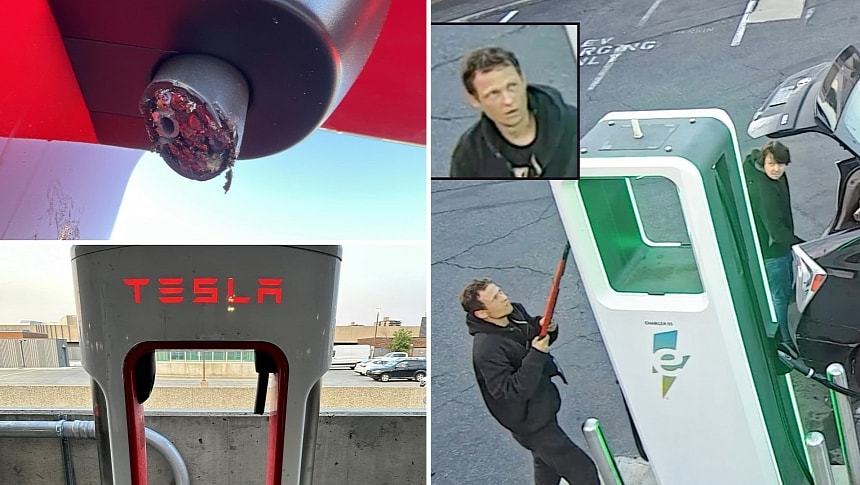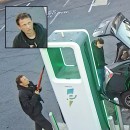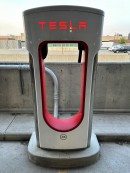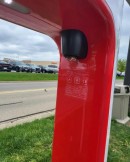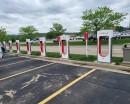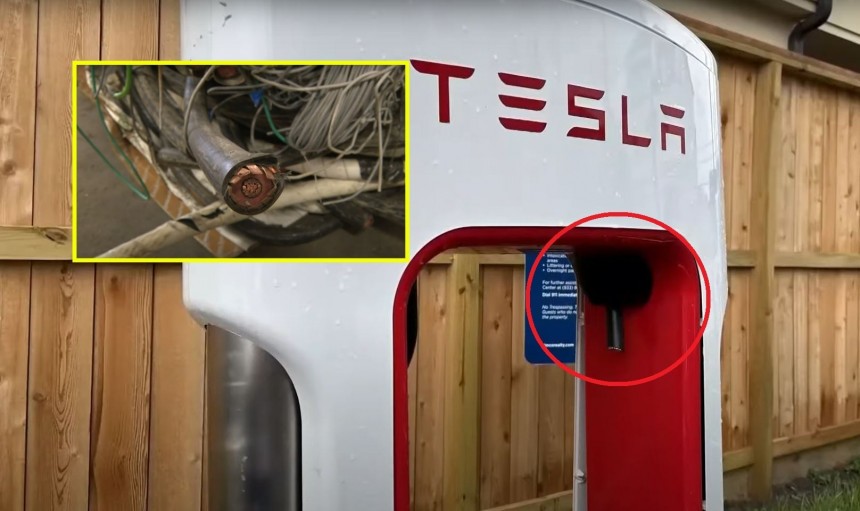Until recently, car owners were terrified of thieves cutting the catalytic converters off their vehicles. Now, a new trend is on the rise, as thieves found out that charging cables contain precious copper. This led to a steep increase in charging cable theft, with over 130 cords stolen from Electrify America stations in the first five months. That's more than during the entire 2023.
As the cost of living exploded, theft has reached epidemic proportions. Everything that has value can be a target, which is why almost nobody and nothing is safe. Car theft exploded as thieves learned to exploit security loopholes in the car's keyless entry systems. Then, creative individuals thought that stealing a used vehicle was nowhere near as good as stealing a new one. That's when thieves started stealing cars from the dealer lots or even from the factory.
Cars are a valued target, but criminals are satisfied with much less. When the fuel prices skyrocketed in 2022, thieves would drill holes in fuel tanks to steal the precious juice. Later, sophisticated criminals learned that they could trick the software systems that control the pumps at the gas station to dispense fuel for free. It's safe to assume that once something becomes expensive enough, it will be on some individuals' "shopping lists."
Catalytic converter theft is in a league of its own, considering how valuable these parts are. Catalytic converters contain precious metals, including rhodium and palladium, that sell for thousands of dollars an ounce. The fact that thieves can cut a catalytic converter in seconds contributed to the theft epidemic.
As you can see, most of these criminal activities targeted combustion vehicles, making EV owners feel somewhat safe. Still, they underestimated the thieves' creativity. Although electric cars don't have gas tanks to siphon or catalytic converters to cut, thieves still discovered something valuable and easy to steal: charging cables. At first, those came from public charging stations, but later, thieves went for people's personal wall chargers.
The Tesla Supercharger stations were the most affected, as the EV maker operates the most extensive network in the US. However, other charging networks haven't been spared either. Coincidentally, charging cable theft started spreading across the US in 2022, which seemed like a difficult year for car owners, no matter the propulsion system.
Soon, thieves became so desperate that they started stealing even wall charger cables. Although these contain less copper, they are thinner and thus easier to cut. This shocked communities, which never had to confront such widespread vandalism before. Having an unprotected wall charger was an open invitation to thieves, who saw the cables as an easy way to make a buck.
Cutting an EV charger's cable might sound like a small offense, but consider that functional chargers are a precious resource for EV owners. Although most people charge their cars at home (if they still have the cable, of course), they rely on public charging stations during road trips. Getting to a station with an empty battery in the middle of the night to find all chargers vandalized is a terrifying experience.
Such experiences could also hinder EV adoption, considering that some EV drivers rely on public chargers as their sole charging source. Non-functional chargers are one of the issues that plague EV owners, with the exception of Tesla owners. Even when thieves have cut Supercharger cables, Tesla teams quickly fix the situation. Third-party networks, on the other hand, have been much slower in reacting.
This has made the problem much more acute for non-Tesla EV owners. They have far fewer charging stations where they can top up the battery during road trips. Losing some of them poses serious problems. This is why things went crazy when the thieves moved from Tesla Superchargers to third-party stations. Electrify America was hit the hardest, probably because the higher power of these chargers (up to 350 kW) means their cables are thicker, with more copper to sell as scrap.
The value of copper has increased to $4.50 per pound from approximately $3.80 between July 2023 and 2024, according to Automotive News, citing Trade Service. This led to a rise in charger cable theft across the country, with over 130 charging cords stolen only from Electrify America in the first five months of the year. That's more cases than in the entire 2023. Washington has the most cases, but thieves have also struck sites in Nevada, California, Arizona, Colorado, Illinois, Oregon, Tennessee, Texas, and Pennsylvania, charging companies told Automotive News.
Stolen cables cost charging companies up to $4,000 each to replace, but they have very little value for thieves. A Level-2 25-foot charging cable contains copper worth about $23. However, extensive stripping is required to extract it, lowering the value to $5-$7 per cable. But that didn't discourage thieves from cutting the cords. To mitigate the problem, EV charging companies started installing surveillance cameras. These have proved effective in catching the thieves, although not to deter them.
Cars are a valued target, but criminals are satisfied with much less. When the fuel prices skyrocketed in 2022, thieves would drill holes in fuel tanks to steal the precious juice. Later, sophisticated criminals learned that they could trick the software systems that control the pumps at the gas station to dispense fuel for free. It's safe to assume that once something becomes expensive enough, it will be on some individuals' "shopping lists."
Catalytic converter theft is in a league of its own, considering how valuable these parts are. Catalytic converters contain precious metals, including rhodium and palladium, that sell for thousands of dollars an ounce. The fact that thieves can cut a catalytic converter in seconds contributed to the theft epidemic.
The Tesla Supercharger stations were the most affected, as the EV maker operates the most extensive network in the US. However, other charging networks haven't been spared either. Coincidentally, charging cable theft started spreading across the US in 2022, which seemed like a difficult year for car owners, no matter the propulsion system.
Soon, thieves became so desperate that they started stealing even wall charger cables. Although these contain less copper, they are thinner and thus easier to cut. This shocked communities, which never had to confront such widespread vandalism before. Having an unprotected wall charger was an open invitation to thieves, who saw the cables as an easy way to make a buck.
Cutting an EV charger's cable might sound like a small offense, but consider that functional chargers are a precious resource for EV owners. Although most people charge their cars at home (if they still have the cable, of course), they rely on public charging stations during road trips. Getting to a station with an empty battery in the middle of the night to find all chargers vandalized is a terrifying experience.
This has made the problem much more acute for non-Tesla EV owners. They have far fewer charging stations where they can top up the battery during road trips. Losing some of them poses serious problems. This is why things went crazy when the thieves moved from Tesla Superchargers to third-party stations. Electrify America was hit the hardest, probably because the higher power of these chargers (up to 350 kW) means their cables are thicker, with more copper to sell as scrap.
The value of copper has increased to $4.50 per pound from approximately $3.80 between July 2023 and 2024, according to Automotive News, citing Trade Service. This led to a rise in charger cable theft across the country, with over 130 charging cords stolen only from Electrify America in the first five months of the year. That's more cases than in the entire 2023. Washington has the most cases, but thieves have also struck sites in Nevada, California, Arizona, Colorado, Illinois, Oregon, Tennessee, Texas, and Pennsylvania, charging companies told Automotive News.
Stolen cables cost charging companies up to $4,000 each to replace, but they have very little value for thieves. A Level-2 25-foot charging cable contains copper worth about $23. However, extensive stripping is required to extract it, lowering the value to $5-$7 per cable. But that didn't discourage thieves from cutting the cords. To mitigate the problem, EV charging companies started installing surveillance cameras. These have proved effective in catching the thieves, although not to deter them.
